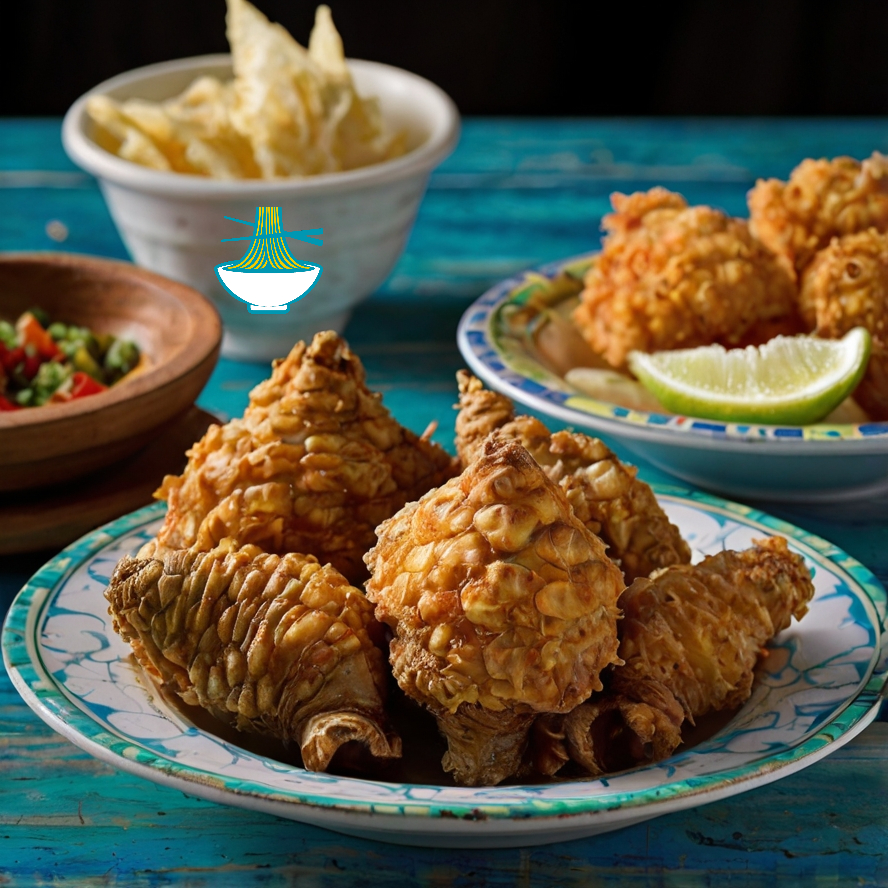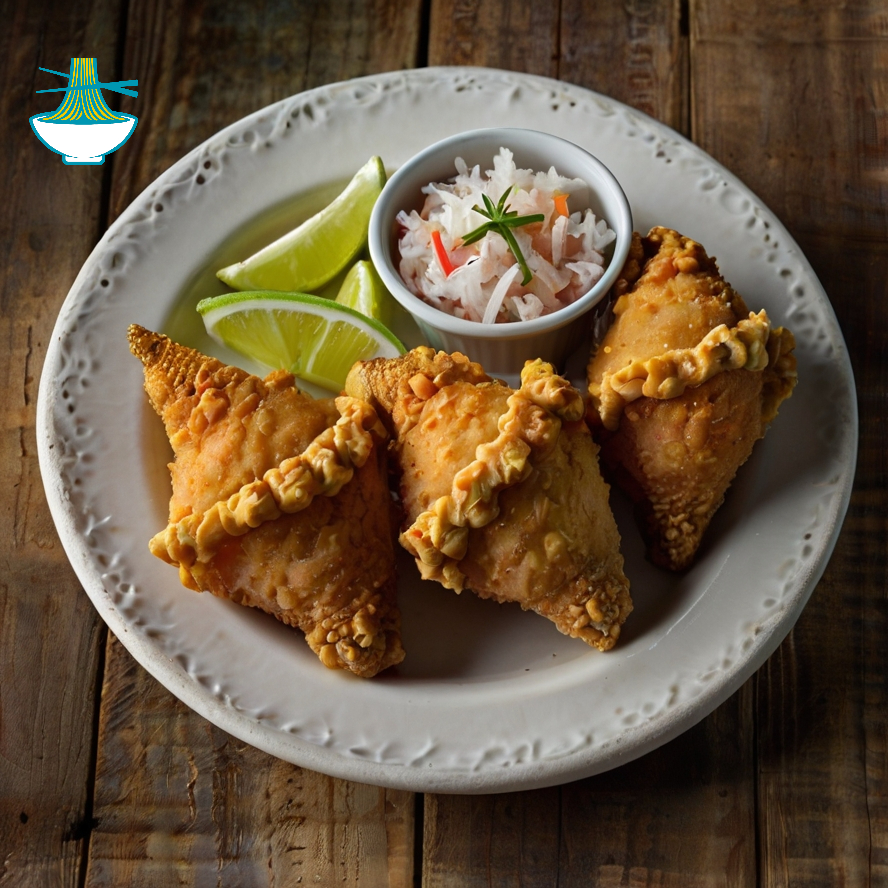Bahamian Cracked Conch is a beloved seafood delicacy in the Bahamas, known for its crispy, savory flavor and tender texture. Made from the meat of the conch, a large sea snail found in the Caribbean, this dish is a staple in Bahamian cuisine. Typically served with sides like rice and peas or coleslaw, Bahamian Cracked Conch is a delightful treat that captures the essence of Bahamian culinary traditions.

Bahamian Cracked Conch has been a cherished part of Bahamian cuisine for generations. The dish originated from the abundance of conch in the Caribbean waters, making it a readily available and affordable source of protein for locals. The method of tenderizing and frying the conch meat has been passed down through generations, ensuring that each bite is perfectly crispy on the outside and tender on the inside. This traditional preparation reflects the resourcefulness and culinary creativity of the Bahamian people.
Ingredients:
- 1 lb. conch meat
- 2 cups all-purpose flour
- 1 tsp. salt
- 1 tsp. black pepper
- 1 tsp. paprika
- 1 tsp. garlic powder
- 1/2 tsp. cayenne pepper
- 1 egg
- 1 cup milk
- Vegetable oil for frying
Instructions:
1. Prepare the Conch: Clean and tenderize the conch meat by removing the tough outer layer. Pound it with a meat mallet or rolling pin until it is thin and tender.
2. Mix Dry Ingredients: In a bowl, combine the flour, salt, black pepper, paprika, garlic powder, and cayenne pepper.
3. Prepare Wet Mixture: In another bowl, whisk together the egg and milk.
4. Heat Oil: Heat vegetable oil in a large pot or deep fryer to 350°F.
5. Coat the Conch: Dip the tenderized conch meat in the egg and milk mixture, then coat it in the flour mixture.
6. Fry the Conch: Fry the coated conch meat in the hot oil for 2-3 minutes on each side, until golden brown and crispy.
7. Drain and Serve: Remove the conch from the oil and place it on a paper towel-lined plate to drain off excess oil. Serve with a side of rice and peas or coleslaw.

Nutrition Value:
1. 1 lb. conch meat
- Calories: Approximately 370
- Carbohydrates: 0g
- Protein: 70g
- Fat: 4g
- Sodium: 140mg
- Cholesterol: 220mg
- Vitamins: Rich in Vitamin E and B vitamins (especially B12)
- Minerals: High in selenium, magnesium, and potassium
- Nutritional Benefit: Conch meat is an excellent source of lean protein, essential for muscle repair and growth. It is also rich in vitamins and minerals that support overall health, including heart health and immune function.
2. 2 cups all-purpose flour
- Calories: 910
- Carbohydrates: 190g
- Protein: 25g
- Fat: 2g
- Sodium: 2mg
- Cholesterol: 0mg
- Vitamins: Small amounts of B vitamins
- Minerals: Minor amounts of iron
- Nutritional Benefit: All-purpose flour provides carbohydrates, which are a primary energy source. It also contains a small amount of protein and iron.
3. 1 tsp. salt
- Calories: 0
- Carbohydrates: 0g
- Protein: 0g
- Fat: 0g
- Sodium: 2325mg
- Cholesterol: 0mg
- Vitamins: None
- Minerals: Sodium
- Nutritional Benefit: Salt enhances the flavor of foods and provides sodium, an essential mineral that helps regulate fluids and nerve function. However, it should be used in moderation to maintain healthy blood pressure levels.
4. 1 tsp. black pepper
- Calories: 6
- Carbohydrates: 1.5g
- Protein: 0.2g
- Fat: 0.1g
- Sodium: 1mg
- Cholesterol: 0mg
- Vitamins: Small amounts of Vitamin K
- Minerals: Trace amounts of iron and manganese
- Nutritional Benefit: Black pepper contains antioxidants and has anti-inflammatory properties. It can also enhance digestion and nutrient absorption.
5. 1 tsp. paprika
- Calories: 6
- Carbohydrates: 1g
- Protein: 0.3g
- Fat: 0.3g
- Sodium: 2mg
- Cholesterol: 0mg
- Vitamins: Rich in Vitamin A and Vitamin E
- Minerals: Contains small amounts of iron and magnesium
- Nutritional Benefit: Paprika is a good source of antioxidants, particularly Vitamin A, which supports eye health and the immune system. It also has anti-inflammatory properties.
6. 1 tsp. garlic powder
- Calories: 10
- Carbohydrates: 2.2g
- Protein: 0.5g
- Fat: 0g
- Sodium: 1mg
- Cholesterol: 0mg
- Vitamins: Small amounts of Vitamin C and B6
- Minerals: Contains trace amounts of calcium and iron
- Nutritional Benefit: Garlic powder has antioxidant and anti-inflammatory properties. It can help boost the immune system and support heart health.
7. 1/2 tsp. cayenne pepper
- Calories: 8
- Carbohydrates: 1.5g
- Protein: 0.3g
- Fat: 0.5g
- Sodium: 1mg
- Cholesterol: 0mg
- Vitamins: High in Vitamin A and Vitamin C
- Minerals: Small amounts of potassium and manganese
- Nutritional Benefit: Cayenne pepper boosts metabolism and has anti-inflammatory properties. It is also rich in antioxidants and can help improve digestion.
8. 1 egg
- Calories: 70
- Carbohydrates: 0.6g
- Protein: 6g
- Fat: 5g
- Sodium: 70mg
- Cholesterol: 186mg
- Vitamins: Contains Vitamins A, D, E, and B12
- Minerals: Rich in iron, phosphorus, and selenium
- Nutritional Benefit: Eggs are a great source of high-quality protein and essential vitamins and minerals. They support eye health, brain function, and muscle maintenance.
9. 1 cup milk
- Calories: 150
- Carbohydrates: 12g
- Protein: 8g
- Fat: 8g
- Sodium: 120mg
- Cholesterol: 30mg
- Vitamins: High in Vitamin D and B12
- Minerals: Rich in calcium and potassium
- Nutritional Benefit: Milk is an excellent source of calcium and Vitamin D, essential for bone health. It also provides protein and other nutrients that support overall health.
10. Vegetable oil for frying (assumed 1/2 cup absorbed)
- Calories: 960
- Carbohydrates: 0g
- Protein: 0g
- Fat: 110g
- Sodium: 0mg
- Cholesterol: 0mg
- Vitamins: None
- Minerals: None
- Nutritional Benefit: Vegetable oil is a source of dietary fat, necessary for absorbing fat-soluble vitamins and providing energy. However, it is important to use it in moderation due to its high-calorie content.


Comments